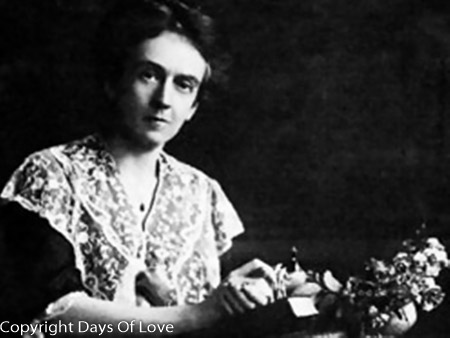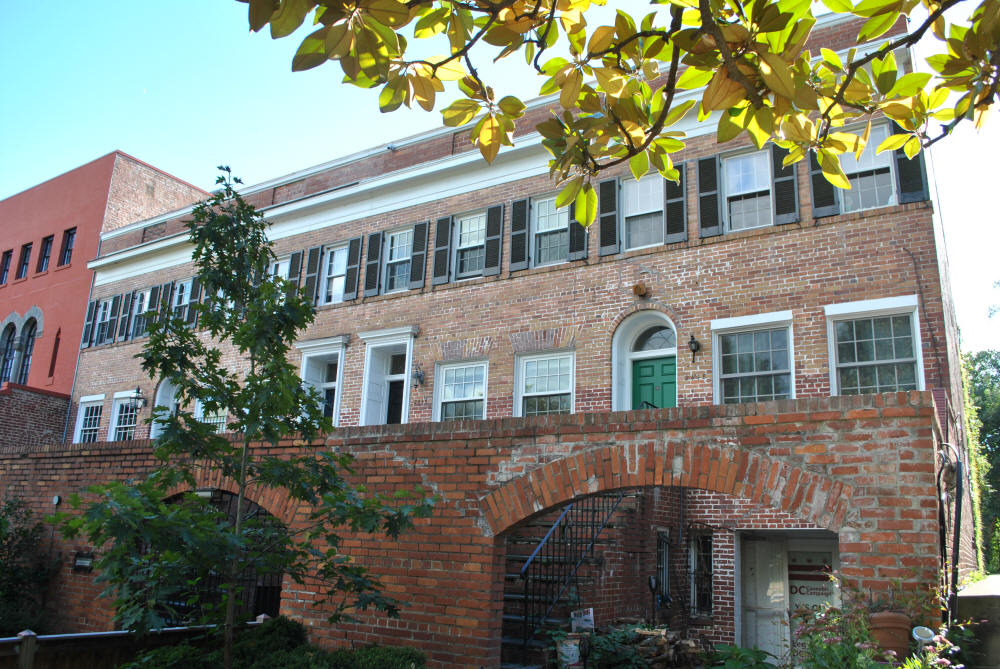BURIED TOGETHER
Partner Doris Fielding Reid, buried together
Queer Places:
Miss Porter's School, 60 Main St, Farmington, CT 06032, Stati Uniti
Bryn Mawr College (Seven Sisters), 101 N Merion Ave, Bryn Mawr, PA 19010
2448 Massachusetts Ave NW, Washington, DC 20008, Stati Uniti
159 Ferry Rd, Lyme, CT 06371, USA
Cove Cemetery, 97 CT-148, Lyme, CT 06371, USA
 Edith Hamilton (August 12, 1867 – May 31, 1963) was an American
educator and internationally-known author who was one of the most renowned
classicists of her era. A graduate of
Bryn Mawr College, she also studied in
Germany
at the
University of Leipzig and the
University of Munich. Hamilton began her career as an educator and
head of the
Bryn Mawr School, a private college preparatory school for girls in
Baltimore,
Maryland;
however, Hamilton is best known for her essays and best-selling books on
ancient Greek and Roman civilizations. A classicist (Bryn Mawr College, A.B. and A.M., 1894), Hamilton was headmistress of the Bryn Mawr School in Baltimore (1896-1922) and an author and translator of numerous books, including The Greek Way (1930) and The Roman Way (1932).
Edith Hamilton (August 12, 1867 – May 31, 1963) was an American
educator and internationally-known author who was one of the most renowned
classicists of her era. A graduate of
Bryn Mawr College, she also studied in
Germany
at the
University of Leipzig and the
University of Munich. Hamilton began her career as an educator and
head of the
Bryn Mawr School, a private college preparatory school for girls in
Baltimore,
Maryland;
however, Hamilton is best known for her essays and best-selling books on
ancient Greek and Roman civilizations. A classicist (Bryn Mawr College, A.B. and A.M., 1894), Hamilton was headmistress of the Bryn Mawr School in Baltimore (1896-1922) and an author and translator of numerous books, including The Greek Way (1930) and The Roman Way (1932).
Hamilton's second career as an author began after her retirement from
Bryn Mawr School in 1922. She was sixty-two years old when her first book,
The Greek Way, was published in 1930. It was an immediate success
and a featured selection by the
Book-of-the-Month Club in 1957. Hamilton's other notable works include
The Roman Way (1932), The Prophets of Israel (1936),
Mythology (1942), and The Echo of Greece (1957).
Critics have acclaimed Hamilton's books for their lively
interpretations of ancient cultures, and she is described as the classical
scholar who "brought into clear and brilliant focus the Golden Age of
Greek life and thought ... with Homeric power and simplicity in her style
of writing".[2]
Her works are said to influence modern lives through a "realization of the
refuge and strength the past" to those "in the troubled present."[3]
Hamilton's younger sister was
Alice Hamilton, an expert in industrial
toxicology and the first woman appointed to the faculty of
Harvard University.

by Rollie McKenna

2448 Massachusetts Ave NW, Washington, DC 20008
Doris Fielding Reid (September 4,
1895 – January 16, 1973) was an American stockbroker. She was the daughter of
Harry Fielding Reid, an American geophysicist,[39]
and Edith Gittings Reid, biographer of Doctor William Osler and President
Woodrow Wilson.[40]
She was a student of Edith Hamilton. Reid was employed by Loomis, Sayles and
Company beginning in 1929. Reid and Hamilton were lifelong friends who lived in
Gramercy Park, Manhattan and Sea Wall, Maine, during which time they raised and
home-schooled Reid's nephew, Francis Dorian Fielding Reid (1917-1973).[40]
After Hamilton's death, Reid published the book Edith Hamilton: An Intimate
Portrait (1967).[41]
Reid died on January 15, 1973, in Lenox Hill, New York. Both women are buried at
Cove Cemetery in Hadlyme, Connecticut.[42]
Hamilton and Doris Reid remained in New York City until 1943, then moved
to Washington, D.C., and spent their summers in Maine. In Washington,
D.C., Reid was in charge of the local offices of Loomis, Sayles and
Company, an investment firm that had been her employer since 1929;
Hamilton continued to write and frequently entertained friends, fellow
writers, government representatives, and other dignitaries at her home.
Among the eminent and famous were Isak Dinesen, Robert Frost, Harvard
classicist Werner Jaeger and labor leader John L. Lewis.[1]
After her move to Washington, D.C., Hamilton became a commentator on
education projects and began to receive honors for her work. Hamilton also
recorded programs for television programs and the Voice of America,
traveled to Europe, and continued to write books, articles, essays, and
book reviews.[43]
Hamilton considered the high point of her life to be a trip to Athens
in 1957, at the age of ninety. She traveled to Greece to hear her
translation of Aeschylus's Prometheus performed at the ancient
Odeon theater of Herodes Atticus. As part of the evening's ceremonies,
King Paul of Greece awarded the Golden Cross of the Order of Benefaction,
Greece's highest honor, and the mayor of Athens made her an honorary
citizen of the city.[28][43][37]
The U.S. news media, including TIME magazine, covered the event and
the press emphasized the "majesty, monumentality, and emotional impact" of
the play's setting.[44]
Hamilton called the ceremony "the proudest moment of my life."[44][45]
My published books:


BACK TO HOME PAGE

 Edith Hamilton (August 12, 1867 – May 31, 1963) was an American
educator and internationally-known author who was one of the most renowned
classicists of her era. A graduate of
Bryn Mawr College, she also studied in
Germany
at the
University of Leipzig and the
University of Munich. Hamilton began her career as an educator and
head of the
Bryn Mawr School, a private college preparatory school for girls in
Baltimore,
Maryland;
however, Hamilton is best known for her essays and best-selling books on
ancient Greek and Roman civilizations. A classicist (Bryn Mawr College, A.B. and A.M., 1894), Hamilton was headmistress of the Bryn Mawr School in Baltimore (1896-1922) and an author and translator of numerous books, including The Greek Way (1930) and The Roman Way (1932).
Edith Hamilton (August 12, 1867 – May 31, 1963) was an American
educator and internationally-known author who was one of the most renowned
classicists of her era. A graduate of
Bryn Mawr College, she also studied in
Germany
at the
University of Leipzig and the
University of Munich. Hamilton began her career as an educator and
head of the
Bryn Mawr School, a private college preparatory school for girls in
Baltimore,
Maryland;
however, Hamilton is best known for her essays and best-selling books on
ancient Greek and Roman civilizations. A classicist (Bryn Mawr College, A.B. and A.M., 1894), Hamilton was headmistress of the Bryn Mawr School in Baltimore (1896-1922) and an author and translator of numerous books, including The Greek Way (1930) and The Roman Way (1932).



